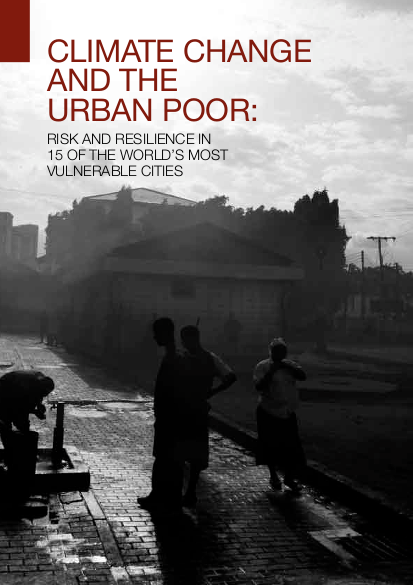
Around the world, climate change is increasingly recognized as a major challenge. The effects are being felt already and will increase in intensity over the coming years. Although the Least Developed Countries – a definition used by the United Nations to describe countries with low gross national income, weak human assets, and high levels of economic vulnerability – account for only 3.2 percent of global greenhouse gas emissions,1 they will be the most seriously affected by a rise in sea level, changing patterns of rainfall and increases in average temperature. Towns and cities in these countries, which are simultaneously dealing with issues of poverty, inadequate infrastructure, and environmental degradation, are particularly vulnerable. New assessments are required to identify patterns of risk, and new strategies are needed to make adaptation easier. This report outlines lessons learnt regarding the principal effects of climate change on 15 cities in low-income countries, and what makes them vulnerable to these effects. Coastal cities (page 2) are susceptible to a rise in sea level and are made vulnerable by the low-lying land they are often built on, while dryland cities (page 6) suffer from scarce water resources due to extended periods of climate change-induced drought. In these and other inland cities (page 12), the level of poverty, the rapid pace of urbanization and a lack of education about climate change increase vulnerability and aggravate the effects of climate change. Innovative urban policies and practices have shown that adaptation (page 16) to some of these effects is possible and can be built into development plans. These include communitybased initiatives led by organizations formed by the urban poor, and local governments working in partnership with their low-income populations.
Resource collections
- UN Habitat - Urban Response Collection
- Urban Response - Urban Crisis Preparedness and Risk Reduction
- Urban Response Collection - Community Engagement and Social Cohesion
- Urban Response Collection - Economic Recovery
- Urban Response Collection - Environment and Climate Change
- Urban Response Collection - Housing, Land and Property
- Urban Response Collection - Urban Crisis Response, Recovery and Reconstruction
- Urban Response Collection - Urban Resilience